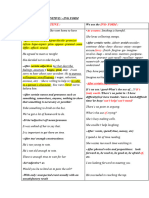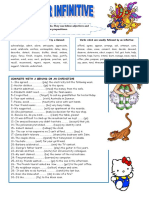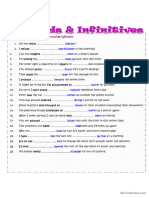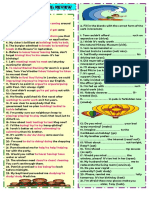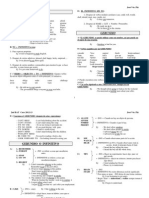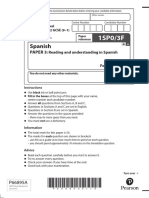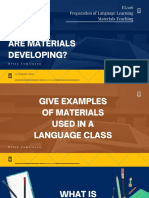0 ratings0% found this document useful (0 votes)
103 views19 pagesThe Infinitive and The Gerund
The document discusses the differences between the gerund and the infinitive in English grammar. [1] It provides examples of verbs that are normally followed by the gerund like "enjoy" and "detest", and verbs normally followed by the infinitive like "agree" and "fail". [2] Some verbs like "begin" and "prefer" can be used with either the gerund or infinitive with little change in meaning. [3] The document concludes with practice exercises asking the reader to identify the correct gerund or infinitive form.
Uploaded by
Reda AouladCopyright
© Attribution Non-Commercial (BY-NC)
Available Formats
Download as PPTX, PDF, TXT or read online on Scribd
Download as pptx, pdf, or txt
0 ratings0% found this document useful (0 votes)
103 views19 pagesThe Infinitive and The Gerund
The document discusses the differences between the gerund and the infinitive in English grammar. [1] It provides examples of verbs that are normally followed by the gerund like "enjoy" and "detest", and verbs normally followed by the infinitive like "agree" and "fail". [2] Some verbs like "begin" and "prefer" can be used with either the gerund or infinitive with little change in meaning. [3] The document concludes with practice exercises asking the reader to identify the correct gerund or infinitive form.
Uploaded by
Reda AouladCopyright
© Attribution Non-Commercial (BY-NC)
Available Formats
Download as PPTX, PDF, TXT or read online on Scribd
Download as pptx, pdf, or txt
Download as pptx, pdf, or txt
You are on page 1/ 19
The infinitive and the Gerund
Presentation by: Mohamed Reda Aoulad Abdelkrim.
INFINITIVE OR GERUND
THE GERUND
* The gerund( also called verbal noun )
refers to the usage of a verb (in its -ing
form) as a noun.
THE INFINITIVE
The infinitive of a verb is its basic form
with or without the particle “to”:
therefore, “do” and “to do” , “go” and
“to go” , …
1/ SOME VERBS ARE
NORMALLY FOLLOWED BY
THE GERUND:
acknowledge , admit , adore , anticipate
, appreciate , avoid , celebrate, confess ,
contemplate , delay, deny, describe,
detest, discuss , dislike , dread , endure ,
enjoy , fancy , finish, imagine , involve ,
keep, justify , mention, mind , miss ,
omit, postpone , practise , quit , recall
,report , resent , resume , risk ,
suggest , tolerate , understand , feel like,
…
For example:
* Peter adores playing computer
games, but he detests watching TV.
* I enjoy going out with my parents.
* The thief admitted having stolen the
car.
* My Mom dislikes eating fast food.
2/ SOME VERBS ARE NORMALLY
FOLLOWED BY THE INFINITIVE :
afford , agree , appear , arrange , ask ,
attempt , care , choose , claim , come,
consent , dare, decide, demand, deserve,
determine, elect, endeavour, expect, fail,
get, guarantee, hate, hesitate, hope,
hurry, incline, intend, learn, long,
manage, mean, need, offer, plan,
prepare, pretend, promise, refuse,
resolve, say, seem, tend, threaten, want,
wish …
For example:
* I can’t afford to buy this car.
* The two countries agreed to settle
their conflict peacefully.
* Don’t hesitate to ask for help if you
have any problem.
* I failed to do the task by myself.
3/ SOME VERBS CAN BE FOLLOWED
BY EITHER THE GERUND OR THE
INFINITIVE:
A/With little or no change in meaning:
begin, continue, hate, like, love, neglect,
prefer, start, recommend, …
For example:
* I like playing / to play chess.
* Our teacher hates being / to be asked
silly questions.
B/With a change in meaning :
forget, remember, stop, try, regret, go on,
mean …
For example:
1/ *I stopped to talk to him. ( interrupt an
activity in order to do something else)
*I stopped talking to him. ( finish an
action in progress )
2/ *I remember closing the door. ( I closed it
and now I remember)
*I remembered to close the door. ( I had
to close it, so I did )
3/ *I regret telling you the bad news. ( I
told you and now I’m sorry about it )
*I regret to tell you the bad news. ( I am
sorry that I have to tell you the bad news)
4/ *He stopped for a while and then went
on talking. ( continued with the same thing)
*The students finished reading the text
and then went on to answer the questions.
( started doing something new)
4/ Expressions followed by the gerund:
_ The gerund is used after prepositions.
I look forward to hearing from you..
Are you thinking of attending the maths evening classes.
_ It’s no use pretending you didn’t see me.
_ It’s no good insisting. He won’t accept.
_ It’s (not) worth watching this movie.
_ There’s no point in shouting at her. She is deaf.
_ Go climbing/ swimming/ skiing/ fishing/ sailing/
shopping...
5/ Expressions followed by the infinitive:
_ After WH words: I didn’t know what to do. / I didn’t know
where to go.
_ After superlatives: London is the best place to visit abroad.
_ After too + adjectives: Tom is too short to play basketball.
_ After adjective + enough: She is not old enough to vote.
_ After every/some/any/no + body/where/thing: There was
nowhere to park. / I felt bored because I had nothing to do.
_ Purpose: He went to the airport to see his father off
PRACTICE ACTIVITY
Put the verbs in brackets into the correct form (gerund or infinitive):
1/ Suddenly everybody stopped …………………… ( talk ). There was silence.
2/ It isn't cold enough ………………..……. ( wear ) a jacket.
3/ You can improve your English by ……………….………
( read ) more. 4/ I live only a short walk from here. It
isn't worth …………….………. ( take ) a taxi.
5/ It was late, so we decided …………………. ( take ) a taxi.
6/ When I'm tired, I enjoy ………………..…… ( watch ) TV.
7/ There is an interesting article on the paper today. It's worth
………………........... ( read)
8/ David was in a difficult situation, so I decided ……...……… ( lend ) him some
money.
9/ Peter adores ………………...… ( play ) cards with his friends.
10/ I left the door open. I didn't remember
………………..…….( close ) it. 11/ I ran 10km without
…………………..….. ( stop ). 12/ Sandra
has got a good camera but she doesn't know how ………………..……….. ( use ) it.
ANSWERS
1/ talking 7/ reading
2/ to wear 8/ to lend
3/ reading 9/ playing
4/ taking 10/ to close
5/ to take 11/ stopping
6/ watching 12/ to use
THANK YOU AND GOOD LUCK
You might also like
- With Some Verbs You Can Use The Structure Verb+ Somebody+ - IngNo ratings yetWith Some Verbs You Can Use The Structure Verb+ Somebody+ - Ing7 pages
- ENGLISH III - NOOOV 18 - 11 GERUNDS and INFINITIVES-2No ratings yetENGLISH III - NOOOV 18 - 11 GERUNDS and INFINITIVES-29 pages
- Gerunds and Infinitives Double ComparativesNo ratings yetGerunds and Infinitives Double Comparatives11 pages
- Cau Truc Va Ngu Phap Tieng Anh Tong Hop Lop 9 1No ratings yetCau Truc Va Ngu Phap Tieng Anh Tong Hop Lop 9 184 pages
- Handout_Unit 3-Noun Equivalents_Week 1-3No ratings yetHandout_Unit 3-Noun Equivalents_Week 1-312 pages
- Unit 5. Gerunds. Being part of Asean Lesson 2 LanguageNo ratings yetUnit 5. Gerunds. Being part of Asean Lesson 2 Language27 pages
- Complete The Sentences Using Gerunds. Don't Change The Meaning of The Sentence0% (1)Complete The Sentences Using Gerunds. Don't Change The Meaning of The Sentence1 page
- The Verb - Infinitives and Gerund - ExercisesNo ratings yetThe Verb - Infinitives and Gerund - Exercises3 pages
- Oxford Discover 4 - Grammar Test - Unit 9 - 10No ratings yetOxford Discover 4 - Grammar Test - Unit 9 - 105 pages
- Gerundios e Infinitivos Con Ejercicios Propuestos100% (1)Gerundios e Infinitivos Con Ejercicios Propuestos4 pages
- Chuyên đề 7 GERUND AND INFINITIVE - BẢN GỐCNo ratings yetChuyên đề 7 GERUND AND INFINITIVE - BẢN GỐC22 pages
- Exemplar - Below The Green Corrie - TOMPLISTNo ratings yetExemplar - Below The Green Corrie - TOMPLIST3 pages
- A Contrastive Study On Chinese and English Idioms and The Teaching Methods of Their TranslationNo ratings yetA Contrastive Study On Chinese and English Idioms and The Teaching Methods of Their Translation8 pages
- Permutation and Combination Practice Questions - Questions & AnswersNo ratings yetPermutation and Combination Practice Questions - Questions & Answers6 pages
- Lesson 3 Agreement: A. Subject-Verb Agreement100% (1)Lesson 3 Agreement: A. Subject-Verb Agreement18 pages
- A review and analysis of four measures of early childhood communication developmentNo ratings yetA review and analysis of four measures of early childhood communication development17 pages
- 1.0 Introduction To Programming 2022 2023 A (FINAL)No ratings yet1.0 Introduction To Programming 2022 2023 A (FINAL)24 pages
- Lista de Verbos Irregulares en Inglés: Present Past Past Participle TraducciónNo ratings yetLista de Verbos Irregulares en Inglés: Present Past Past Participle Traducción67 pages
- With Some Verbs You Can Use The Structure Verb+ Somebody+ - IngWith Some Verbs You Can Use The Structure Verb+ Somebody+ - Ing
- ENGLISH III - NOOOV 18 - 11 GERUNDS and INFINITIVES-2ENGLISH III - NOOOV 18 - 11 GERUNDS and INFINITIVES-2
- Unit 5. Gerunds. Being part of Asean Lesson 2 LanguageUnit 5. Gerunds. Being part of Asean Lesson 2 Language
- Complete The Sentences Using Gerunds. Don't Change The Meaning of The SentenceComplete The Sentences Using Gerunds. Don't Change The Meaning of The Sentence
- Languages Fast and Easy ~ Swedish PhrasebookFrom EverandLanguages Fast and Easy ~ Swedish Phrasebook
- Mandarin Chinese The Right Way! Going ShoppingFrom EverandMandarin Chinese The Right Way! Going Shopping
- A Contrastive Study On Chinese and English Idioms and The Teaching Methods of Their TranslationA Contrastive Study On Chinese and English Idioms and The Teaching Methods of Their Translation
- Permutation and Combination Practice Questions - Questions & AnswersPermutation and Combination Practice Questions - Questions & Answers
- A review and analysis of four measures of early childhood communication developmentA review and analysis of four measures of early childhood communication development
- 1.0 Introduction To Programming 2022 2023 A (FINAL)1.0 Introduction To Programming 2022 2023 A (FINAL)
- Lista de Verbos Irregulares en Inglés: Present Past Past Participle TraducciónLista de Verbos Irregulares en Inglés: Present Past Past Participle Traducción




















